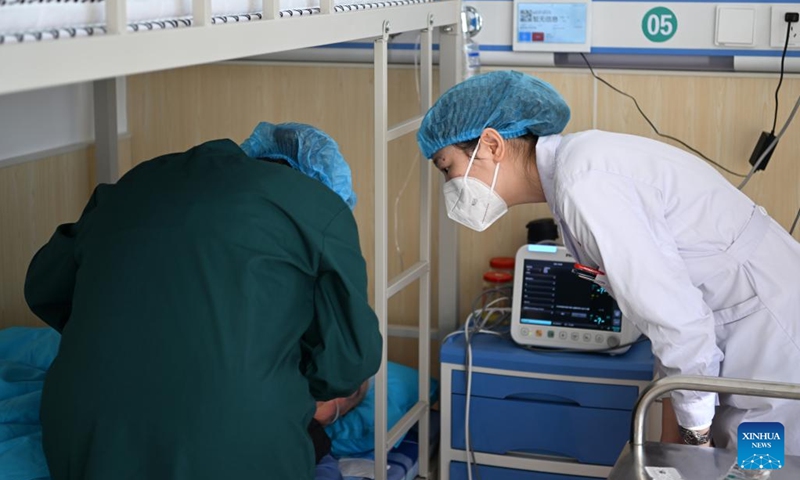
Medical workers treat a patient in a temporary fever clinic at Traditional Chinese Medicine Hospital of Xiqing District, North China's Tianjin, December 28, 2022. Photo: Xinhua
A number of provinces and regions across China including Beijing, Chongqing, Henan and Jiangsu have reported that they have already passed the first peak of COVID-19 infections since December 2022. In this round of the epidemic, some cities have passed the peak of infections, but for some it has just started, so the infection peak will last for two to three months nationwide and the peak of severe cases will last longer, said Zeng Guang, a former chief epidemiologist at the Chinese Center for Disease Control and Prevention (CDC).
"Our priority focus has been on the large cities. It is time to focus on rural areas," Zeng said at a press conference on vaccine research and development results recently, according to a Caixin report on Thursday.
Zeng repeatedly expressed concern about the situation in rural areas. He noted that a large number of people are left behind in rural areas including the elderly, the sick and the disabled, and the medical conditions are relatively poor, said the report. The strategy for prevention and control in rural areas has been developed, but the problem is how to implement the strategy, Zeng said.
China has administered 3.4 billion doses of vaccines so far, 3.3 billion of which were inactivated, and the number of alternative vaccines is relatively small, said Caixin.
Homologous booster vaccination should be stopped, Zeng said, noting that this would not be to deny the historic contribution of inactivated vaccines.
Instead, we should "give awards to inactivated vaccines," which emerged at a time when China most needed vaccines for COVID-19 prevention and control, with mature technology, safety, convenient storage and the need to build a good foundation for sequential immunization, according to Zeng.
Based on the actual epidemic situation in China, homologous booster vaccination means two or three doses of the inactivated vaccines plus one shot of the inactivated vaccine, while sequential booster immunization means two or three doses of the inactivated vaccines plus a recombinant protein vaccine, an adenovirus vector vaccine, or an mRNA vaccine.
"The epidemic is spreading much faster than the speed of vaccination. If some vaccines had been used for sequential immunization even six months or three months earlier, the situation would be different," Zeng was quoted as saying by the Caixin report.
In terms of China's current vaccination strategy, Zeng believes there is a need to emphasize sequential immunization, and multivalent vaccines are also needed.
The World Health Organization recommends that people who have recovered from infection can be vaccinated after three to six months, according to Zeng.
As for the XBB strain, which has caused concerns about whether it will cause a new round of the epidemic, Zeng said there shouldn't be panic or worry.
Global Times




